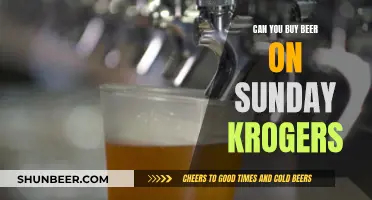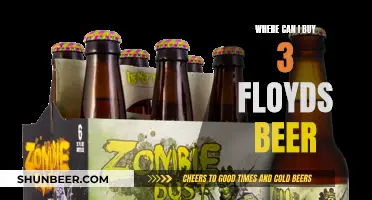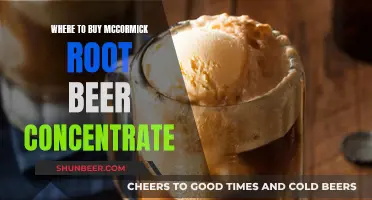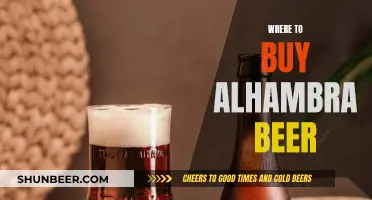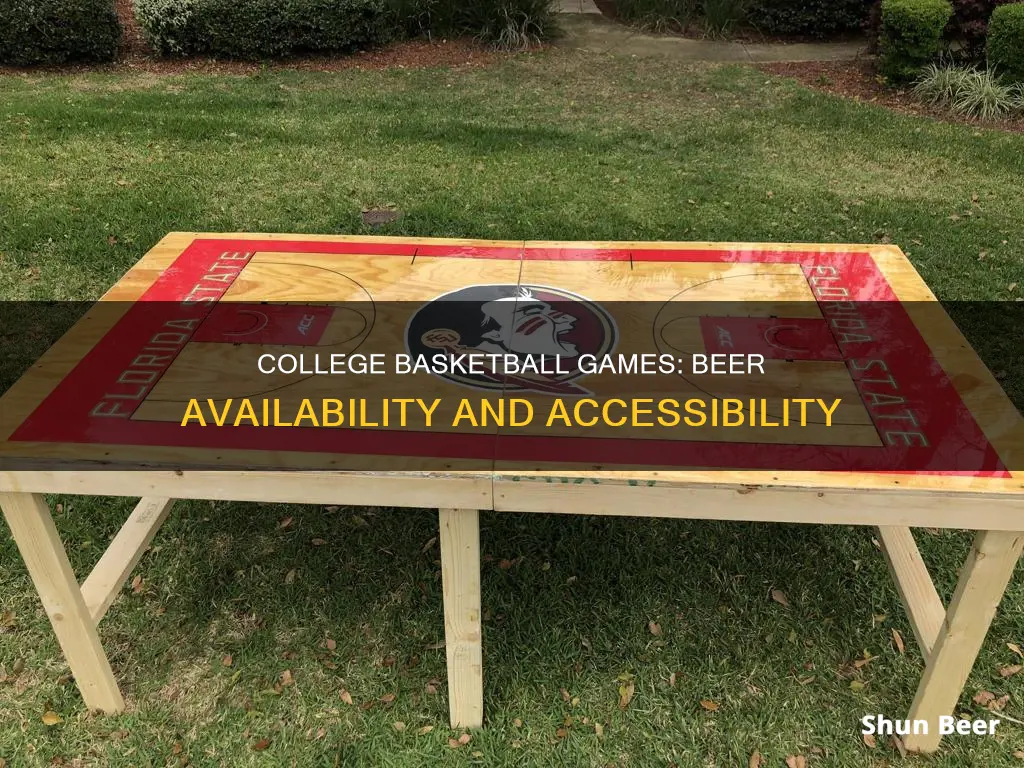
College basketball games and alcohol consumption have had a complicated relationship. While it is common to see fans enjoying a cold beer while cheering on their favourite team, the rules regarding alcohol sales at college sports events have been stringent. In the past, alcohol sales were prohibited at college basketball games, with the NCAA enforcing a ban on alcoholic beverages at championship events. However, in recent years, there has been a shift towards relaxing these restrictions, with the Division I Council approving alcohol sales at NCAA championship events, including basketball tournaments. This has led to a situation where some college basketball games now allow beer sales, while others maintain a strict no-alcohol policy. The decision to sell alcohol often lies with the venue and the university, with some choosing to maintain a ban on alcohol sales to the general public, while others embrace it as a way to boost revenue and enhance the fan experience.
What You'll Learn

Beer is allowed at NCAA championship events
The approval of alcohol sales at NCAA championship events followed a pilot program that allowed beer and wine sales to fans in general seating areas at the Men's and Women's College World Series. The pilot program yielded positive results, with improved fan behavior and a more even flow of patrons entering the arena. The sale of alcoholic beverages has been a successful strategy for increasing revenue and enhancing the fan experience.
However, it is important to note that the decision to sell alcohol at NCAA championship events is not mandatory for all venues. Each venue has the autonomy to decide whether to sell alcoholic beverages. For example, during the 2019 men's basketball tournament, nine out of ten arenas chose to sell alcohol as part of their general concessions, while the Colonial Life Arena in South Carolina opted not to.
The NCAA's policy on alcohol sales has evolved over time, and the organization has shown a willingness to reconsider its approach based on data and feedback. The change in policy has been influenced by the relaxation of rules by the NCAA and conferences, as well as the desire to align with fan expectations and provide a consistent experience across different sporting events.
While the availability of beer at NCAA championship events is now permitted, there are still some restrictions in place. For instance, vendors are not allowed to replenish stands with packaged beer and wine after the teams enter the facility. Additionally, alcohol signs in the seating bowl must be covered up per NCAA restrictions. These measures ensure a balanced approach to alcohol sales, prioritizing both fan enjoyment and safety.
Yuengling Beer: New Mexico's Availability and Accessibility
You may want to see also

Beer sales at college games are a revenue driver
Beer sales at college games have become an increasingly important revenue driver for colleges and universities. While the sale of alcohol at college sporting events was once rare, it has now become commonplace, with 80% of major college football schools selling alcohol inside stadiums. This shift has occurred over the past decade, with the biggest jump in alcohol sales occurring in 2019.
The change has been driven by a combination of factors, including a relaxation of rules by the NCAA and conferences, as well as the recognition that alcohol sales can boost revenue and attract fans. In 2018, the Division I Council approved a rule change to make it legal for fans to buy alcoholic beverages at NCAA championship events, marking a significant shift in policy.
The impact of this policy change can be seen in the number of schools now selling alcohol at college games. Of the 133 FBS schools in 2023, 117 (88%) will sell alcohol this season. This includes schools like Florida International and Southern Mississippi, which will be selling alcohol stadium-wide, not just in premium locations. The University of Michigan, for example, has also recently allowed alcohol sales at its football, hockey, and basketball games after the state lifted a ban on alcohol sales at college sporting events.
The exception to this trend is the state of Utah, which has strict liquor laws and does not allow alcohol sales at any FBS games. Additionally, some individual colleges have chosen to maintain a ban on alcohol sales at their games, such as the University of South Carolina during the 2019 NCAA men's basketball tournament.
Overall, the sale of beer and other alcoholic beverages at college games has become a significant revenue driver for colleges and universities across the country. It has also contributed to an improvement in fan behavior and crowd flow, as fans no longer need to rush to finish their drinks before entering the venue.
Thanksgiving Alcohol Laws in Texas: Beer and Wine?
You may want to see also

Beer sales have improved fan behaviour
The sale of beer at college basketball games is a relatively new development. Previously, there was a rule against selling beer at NCAA events, but this was lifted in 2018. Now, fans can buy beer at college basketball games, and the impact on fan behaviour has been positive.
One of the main concerns surrounding the sale of beer at college basketball games was the potential for increased drunk and disorderly behaviour. However, the opposite has been observed. At the Sprint Center, which hosts the Big 12 Conference men's basketball tournament, arena officials have seen an improvement in fan behaviour tied to alcohol sales. Brenda Tinnen, the senior vice president and general manager of the Sprint Center, noted that the policy has essentially slowed down fans' alcohol intake, as they no longer feel the need to rush and finish their drinks before entering the arena. This has resulted in fewer drunk and rowdy fans at the beginning of the game.
Additionally, the sale of beer at college basketball games has helped to improve attendance and revenue. West Virginia University, for example, has received more than $3 million in revenue from alcohol sales since it began selling beer in 2011. Other universities, such as Ohio State and Tulsa, have also reported high returns on their investment in alcohol sales. Improved attendance and revenue can lead to further enhancements to the fan experience, such as in-stadium instant replay and more sophisticated concessions menus.
Furthermore, the sale of beer at college basketball games has been shown to reduce the pressure on fans to preload or binge drink before entering the stadium. Jack Miner, director of operations at Ohio State's registrar office, noted that one of the conversations they've been having is about how they can compete with other fan experiences. By offering beer sales, colleges can provide an enhanced fan experience that meets the expectations of fans accustomed to buying beer at other sporting events and concerts.
Overall, the sale of beer at college basketball games has been shown to improve fan behaviour and enhance the overall fan experience. Through improved attendance, revenue, and fan satisfaction, the sale of beer has had a positive impact on college basketball games and continues to be a successful strategy for colleges and universities.
Beer-Making Kits: Under 21 and Ready to Brew?
You may want to see also

Beer sales are banned in Utah
In 2018, the Division I Council approved a rule change that made it legal for fans to buy alcoholic beverages at NCAA championship events. This was a significant shift, as the sale of alcohol at college sporting events had previously been prohibited. The change brought college basketball and football events in line with other college sporting events, such as the New Year's Six college football bowl games and each game in the College Football Playoff, which had already permitted alcohol sales.
Since the rule change, many colleges and universities have allowed the sale of alcohol at their sporting events, with some schools even selling alcohol in general seating areas. However, there are still some schools that do not permit alcohol sales, such as the University of Michigan and the University of Washington. These schools often have strict tailgating instructions that limit where, when, and how alcohol can be served.
While the sale of alcohol at college basketball and football games is now permitted, there are still some restrictions in place. For example, vendors are not allowed to replenish stands with packaged beer and wine after the teams enter the facility, and alcohol signs in the seating bowl must be covered up per NCAA restrictions. Despite these restrictions, the sale of alcohol at college sporting events is generally seen as a positive change, providing a key revenue stream for venues and improving fan behaviour.
The Best Places to Buy Authentic American Beer
You may want to see also

Workarounds to the no-beer rule
While some college basketball games have started allowing the sale of beer and wine, many still maintain a strict no-alcohol policy. Here are some workarounds to the no-beer rule:
- The iFlask: Designed to look like a smartphone, the iFlask holds five ounces of liquid and is accessed by sliding a panel and drinking from the "earphone jack."
- Sneaky Shorts: These shorts have bladders that hold up to 24 ounces of liquid and come with dual straws for sipping.
- Sippin' Seat: This stadium cushion has a 24-ounce liquid reservoir and a dispensing hose, allowing you to sip your drink while sitting comfortably.
- Beer Belly: Designed to look like a beer belly, this pouch holds 80 ounces of liquid and is worn around the shoulders under a large shirt.
- Beer Beard: Pair a fake beard with a flannel shirt and a rubber axe, and you can laugh your way through security with 72 ounces of brew beneath your chin.
- Liquor Skin: Pour your drink into a soda can, or use Canoflage to disguise your beer can as a soft drink.
- Alcoholic Gummy Bears: Immerse gummy bears in alcohol for a few hours, and you'll have tasty treats that also give you a buzz.
- Wine Rack: For ladies only, this sports bra has a built-in reservoir that can hold up to 25 ounces of liquid and comes with an extendable straw.
- Rum Runner Flask: A classic and collapsible flask that comes in various sizes, from eight ounces to 32 ounces.
- Poofy Jacket: Stick a few cans in the pockets, and with a responsible look on your face, you may be able to stroll through security without raising suspicions.
- Binocular Flask: Holding 16 ounces of liquid, these binoculars will not only help you see the game but also let you sip your favourite drink.
Please note that attempting to sneak alcohol into a college basketball game may violate the rules and laws of the venue and local jurisdiction. The methods described above are creative ways that people have tried to bypass these restrictions, but there is always a risk of getting caught and facing the consequences.
Best Online Stores for Beer Mug Shoppers
You may want to see also
Frequently asked questions
It depends on the college and the venue. While some colleges sell alcohol during college basketball games, others do not. For example, the University of South Carolina's Colonial Life Arena does not sell alcohol during basketball games. On the other hand, the University of Michigan sells alcohol at basketball games after Governor Gretchen Whitmer lifted the ban on alcohol sales at college sporting events in the state.
Yes, the Division I Council approved alcohol sales at NCAA championship events in 2018.
Yes, the NCAA tourney allows beer and wine sales in public spaces.
Yes, most Power 5 schools sell alcohol inside stadiums. Of the 133 FBS schools in 2023, 117 (88%) sold alcohol.
No, according to NCAA rules, alcoholic beverages cannot be sold or otherwise made available for public consumption at championship events. Additionally, no such beverages are allowed to be brought to the site during the championship.



